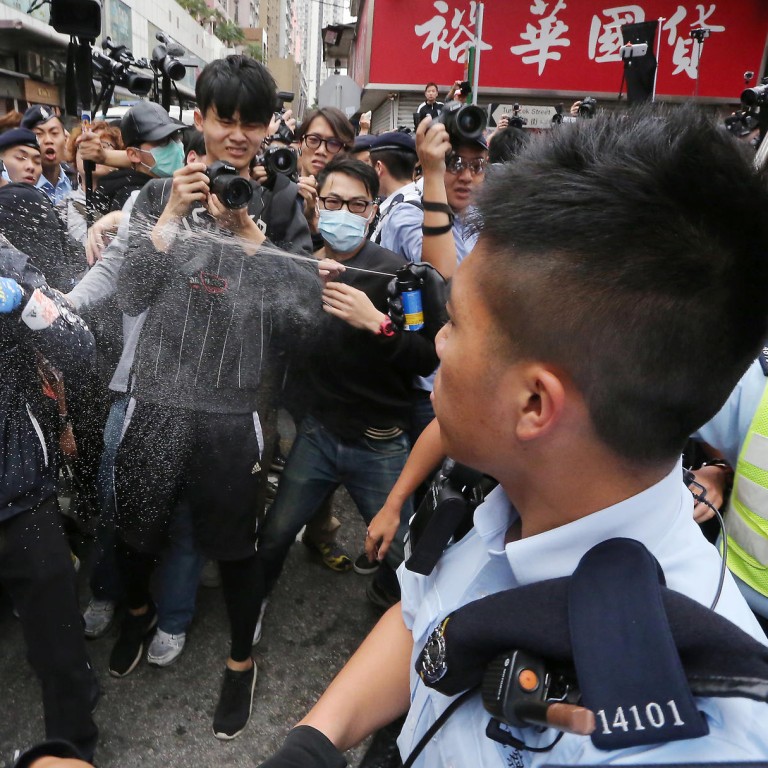
Views sharply divided over mainland Chinese shoppers visiting Hong Kong's Yuen Long
Yuen Long leaders, businesses back visitors; residents less enthusiastic
As you hop off bus B1 from the border at Yat San Street and take a walk along Castle Peak Road in central Yuen Long, three pharmacies in very close proximity already have their doors wide open waiting for the Shenzhen shoppers.
As you walk further along to the junction of Tai Tong Road and Castle Peak Road, the pavement gets narrower and people - some pushing trolleys - scramble through to their next shopping destination.
Lu Kaiyi, who lives in Shenzhen, was carrying a suitcase. She was ready to spend a few thousand dollars on skincare products, daily essentials and drugs.
She visits Yuen Long once a week on her multiple-entry permit. She says she finds protests against mainlanders "radical".
"It may be true that many mainlanders coming to Hong Kong to shop cause crowded streets and products being out of stock. But think about it some more, because without the individual travel scheme Hong Kong would not be as prosperous as it is now," Lu said.
A housewife, who gave her surname as Ho, moved to Yuen Long from Sha Tin three years ago. She said the town was becoming ever more crowded.
"If I had a choice I would have moved back to Sha Tin. The pavement [here] is too narrow. It's too crowded … There are many trolleys around, and people don't apologise when the wheels run over my foot. It's as if I'm standing in their way," Ho said.
Her view was echoed by Hong Kong fashion designer William Tang Tat-chi, an indigenous villager who has lived in Ping Shan near Yuen Long for over 40 years.
Tang said he was "sad" to see Yuen Long rapidly developing in recent years, especially after the opening of new border checkpoints in Lok Ma Chau and Shenzhen Bay, making it easier for Shenzhen residents to visit.
Things have certainly changed. Traditional bakeries and shops selling Chinese sausages and other traditional groceries have been forced to make way for pharmacies, jewellers and cosmetic shops because of rising rents.
Tang slammed politicians and the government for doing nothing to improve town planning amid "unbalanced" development, a continual increase in the number of people living in Yuen Long and parallel traders and mainland visitors flooding the narrow streets.
He said Yuen Long had been "prostituted" by parallel traders and Shenzhen visitors at the expense of the daily life of locals.
"This is like rape, and they put down money after their dealings. They don't have to care about the mood and the state of the prostitutes' bodies. Yuen Long people are not prepared for this and they do not expect it either," said Tang.
But his remarks upset district leaders. DAB legislator Leung Che-cheung, who also chairs the Yuen Long District Council, said: "It is an overstatement … There is nothing wrong in doing business. We should not label them as if they are criminals."
Shap Pat Heung rural committee chairman Leung Fuk-yuen also disagreed with Tang's views. "He is a designer and knows much about fashion. Perhaps he sees social issues from a more artistic point of view," he said, adding that respect was expected from a fellow indigenous villager.
A staff member at Well Done Pharmacy, who gave his surname as Chan, said he believed doing business with mainland customers would not affect the lives of locals. He said 70 per cent of customers were from the mainland.
Kowloon Motor Bus, which operates the B1 service between Tin Shui Wai and the Lok Ma Chau border checkpoint, said additional frontline staff had been sent to bus stops on the Yuen Long section of Castle Peak Road at peak hours.
